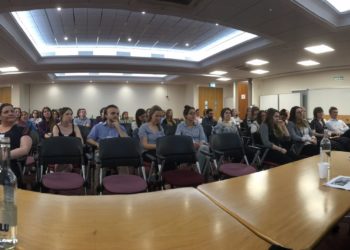Although the current environment for career development may not appear particularly welcoming, it could present a unique opportunity for professionals to step back and thoughtfully assess their goals for the future. While waiting to see what that future brings, it might be a good time for us all to take stock of our core skill sets and explore what opportunities are out there, waiting to be seized upon.
The Professional Skills Map, initiated by the Society for Scholarly Publishing (SSP) Career Development Committee (CDC) aims to guide scholarly publishing professionals across industries and career levels in recognizing their personal strengths and interpersonal and technical skills, and then map those skill sets to fitting roles across the industry, empowering them to advance in their current roles and explore potential career paths they may not have previously considered.
The mapping tool, developed by the SSP CDC based on responses to a survey conducted in autumn 2019, draws correlations between respondents’ current roles and their self-reported areas of strength and desired development.
Respondents were asked to share the type of organization they were affiliated with, the business area for their current role, their title, and number of years in the industry. They were then asked to identify multiple personal characteristics and skills affiliated with their current position and future career development. Using data from 235 individuals, the mapping tool draws correlations between respondents’ current roles and their self-reported areas of strength and desired development.
Respondent Demographics:
Among 235 respondents, 56% were from publishing companies, 25% were from societies, 6% were from research or service providers, 5% were from libraries, and 9% selected ‘other.’
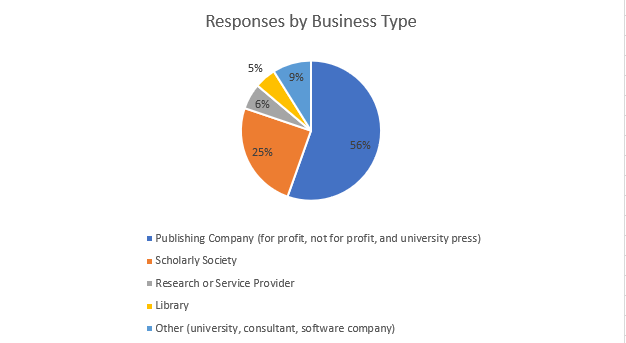
Among Publishers, the top reported business areas were Journals Editorial or Publishing (37%), Executive Management (8%), Production or Content Operations (8%), Marketing (7%), and Books/Reference Editorial or Publishing (7%).
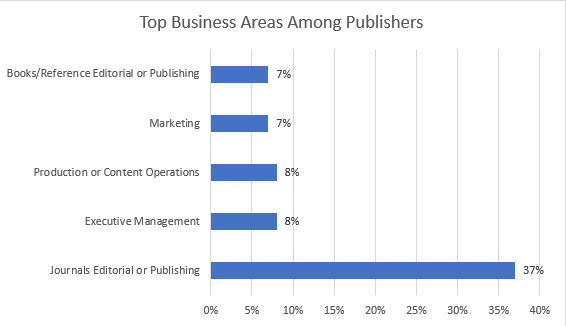
Among Societies, the top reported business areas were Journals Editorial or Publishing (41%), Society Publications (19%), Executive Management (9%), Digital or Platform Strategy (9%), Production or Content Operations (5%), and Marketing (5%).
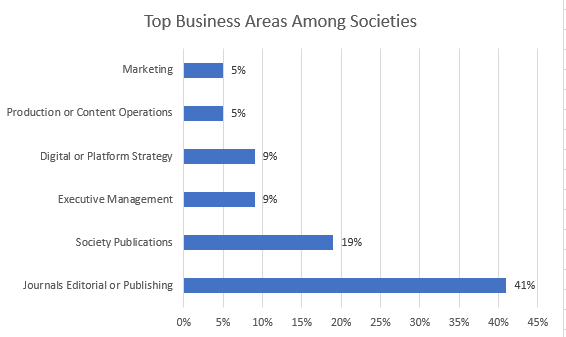
Among Service Providers, the top reported business area was Business Development, and among Libraries, the top business area was Scholarly Communications.
Respondents in Publishing reported 90 different titles, with Publisher the most common.
Society respondents reported 47 different titles; Managing Editor was the most common.
Service Providers reported 14 titles, and Library respondents reported 9 titles.
Regarding years of experience, most respondents were early to mid-career, although there was good representation from all career levels.
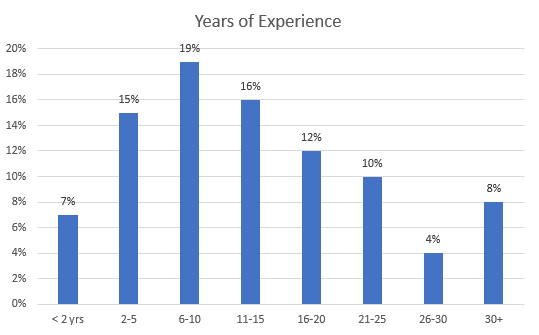
A clear caveat to this data is that we received far more responses from some areas than others, and we make no claim to statistical significance from a data perspective. But the patterns that emerged are revealing. Are you a “people person” with a knack for problem solving and negotiation? A career in books acquisitions may be for you. Highly detail-oriented and collaborative types may excel in production management, while great networking and writing skills are useful for a library scholarly communications specialist. SSP plans to redeploy this survey on an annual basis in order to refine the methodology and capture a larger share of respondents across diverse functions. As the pool of responses grows and evolves, the map will be updated accordingly to reflect the state of the profession.
The Professional Skills Map is available on the SSP website. It is divided into four broad categories at the top level, followed by the professional roles reported by survey respondents (you can find the percentage of respondents listed after each role). Each role can be expanded to reveal the desirable personal characteristics, essentials for success, and emerging needs for that role. Skills and characteristics at the end of each branch indicate the percent of respondents who endorsed that item. Explore the map to learn more!
We hope this new tool and its future iterations will help scholarly publishing professionals (and aspiring professionals) to make the most of their greatest strengths and recognize possible skill development areas needed to achieve their goals.
We welcome feedback on the tool, as it is intended to be ever-evolving to match the state of our industry, and we look forward to your responses to the survey each fall.
Discussion
1 Thought on "Guest Post — Navigating Your Career in Publishing: Introducing the SSP Professional Skills Map"
Love love love this!! This is a must do activity for mentors and mentees!!

